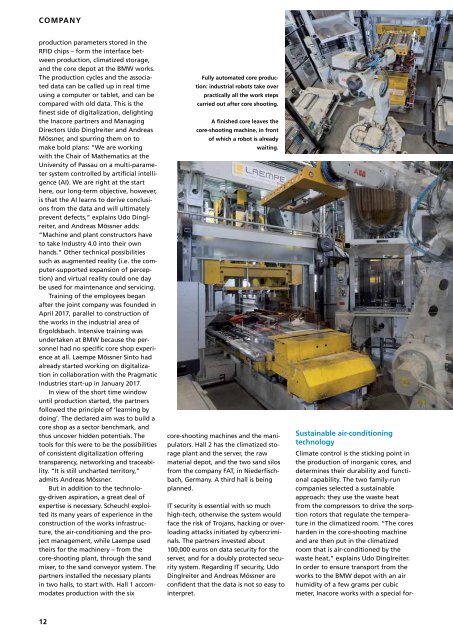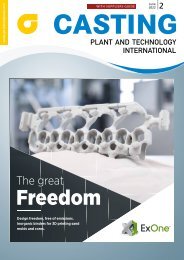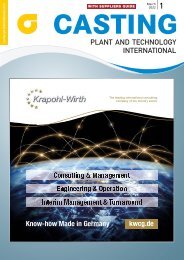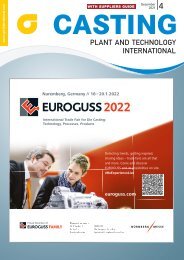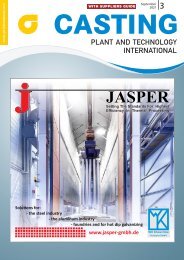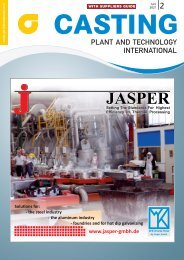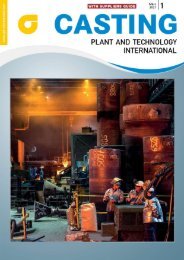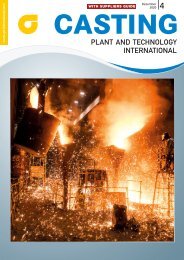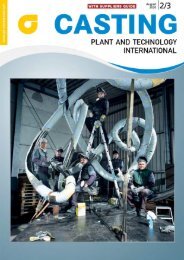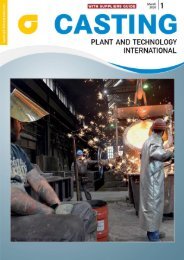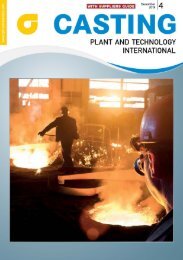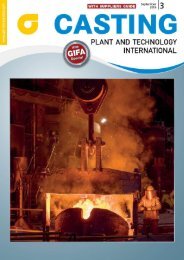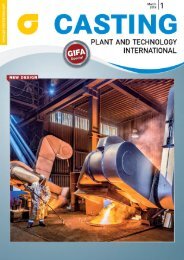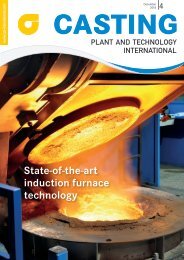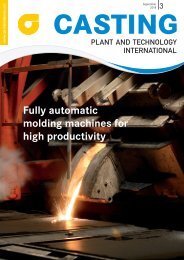CPT International 02/2019
- No tags were found...
Create successful ePaper yourself
Turn your PDF publications into a flip-book with our unique Google optimized e-Paper software.
COMPANY<br />
production parameters stored in the<br />
RFID chips – form the interface between<br />
production, climatized storage,<br />
and the core depot at the BMW works.<br />
The production cycles and the associated<br />
data can be called up in real time<br />
using a computer or tablet, and can be<br />
compared with old data. This is the<br />
finest side of digitalization, delighting<br />
the Inacore partners and Managing<br />
Directors Udo Dinglreiter and Andreas<br />
Mössner, and spurring them on to<br />
make bold plans: “We are working<br />
with the Chair of Mathematics at the<br />
University of Passau on a multi-parameter<br />
system controlled by artificial intelligence<br />
(AI). We are right at the start<br />
here, our long-term objective, however,<br />
is that the AI learns to derive conclusions<br />
from the data and will ultimately<br />
prevent defects,” ex plains Udo Dinglreiter,<br />
and Andreas Mössner adds:<br />
“Machine and plant constructors have<br />
to take Industry 4.0 into their own<br />
hands.” Other technical possibilities<br />
such as augmented reality (i.e. the computer-supported<br />
expansion of perception)<br />
and virtual reality could one day<br />
be used for maintenance and servicing.<br />
Training of the employees began<br />
after the joint company was founded in<br />
April 2017, parallel to construction of<br />
the works in the industrial area of<br />
Ergoldsbach. Intensive training was<br />
undertaken at BMW because the personnel<br />
had no specific core shop experience<br />
at all. Laempe Mössner Sinto had<br />
already started working on digitalization<br />
in collaboration with the Pragmatic<br />
Industries start-up in January 2017.<br />
In view of the short time window<br />
until production started, the partners<br />
followed the principle of ‘learning by<br />
doing’. The declared aim was to build a<br />
core shop as a sector benchmark, and<br />
thus uncover hidden potentials. The<br />
tools for this were to be the possibilities<br />
of consistent digitalization offering<br />
transparency, networking and traceability.<br />
“It is still uncharted territory,”<br />
admits Andreas Mössner.<br />
But in addition to the technology-driven<br />
aspiration, a great deal of<br />
expertise is necessary. Scheuchl exploited<br />
its many years of experience in the<br />
construction of the works infrastructure,<br />
the air-conditioning and the project<br />
management, while Laempe used<br />
theirs for the machinery – from the<br />
core-shooting plant, through the sand<br />
mixer, to the sand conveyor system. The<br />
partners installed the necessary plants<br />
in two halls, to start with. Hall 1 accommodates<br />
production with the six<br />
Fully automated core production:<br />
industrial robots take over<br />
practically all the work steps<br />
carried out after core shooting.<br />
A finished core leaves the<br />
core-shooting machine, in front<br />
of which a robot is already<br />
waiting.<br />
core-shooting machines and the manipulators.<br />
Hall 2 has the climatized storage<br />
plant and the server, the raw<br />
material depot, and the two sand silos<br />
from the company FAT, in Niederfischbach,<br />
Germany. A third hall is being<br />
planned.<br />
IT security is essential with so much<br />
high-tech, otherwise the system would<br />
face the risk of Trojans, hacking or overloading<br />
attacks initiated by cybercriminals.<br />
The partners invested about<br />
100,000 euros on data security for the<br />
server, and for a doubly protected security<br />
system. Regarding IT security, Udo<br />
Dinglreiter and Andreas Mössner are<br />
confident that the data is not so easy to<br />
interpret.<br />
Sustainable air-conditioning<br />
technology<br />
Climate control is the sticking point in<br />
the production of inorganic cores, and<br />
determines their durability and functional<br />
capability. The two family-run<br />
companies selected a sustainable<br />
approach: they use the waste heat<br />
from the compressors to drive the sorption<br />
rotors that regulate the temperature<br />
in the climatized room. “The cores<br />
harden in the core-shooting machine<br />
and are then put in the climatized<br />
room that is air-conditioned by the<br />
waste heat,” explains Udo Dinglreiter.<br />
In order to ensure transport from the<br />
works to the BMW depot with an air<br />
humidity of a few grams per cubic<br />
meter, Inacore works with a special for-<br />
12


